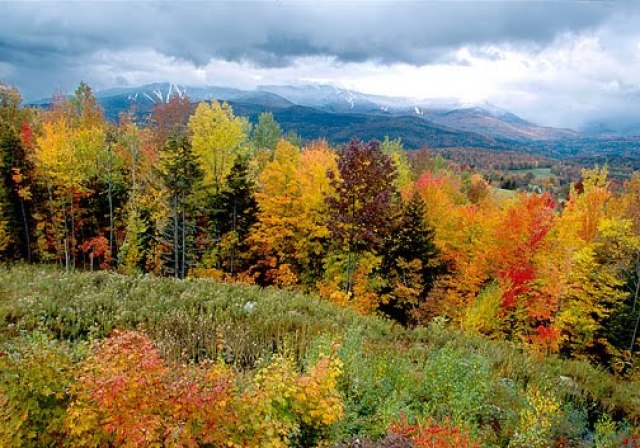Temperate deciduous forests can be found in the eastern part of the United States and Canada, most of Europe and parts of China and Japan.
TundraThe temperate deciduous forest is a biome that is always changing. It has four distinct seasons: winter, spring, summer and fall. Winters are cold and summers are warm. Temperate deciduous forests get between 30 and 60 inches of precipitation a year. Precipitation in this biome happens year round. Because the soil is very fertile and hardwood trees are good for building, this biome has some of the world's largest population centers in it.
The leaves of deciduous trees change color and fall off in the autumn and grow back in the spring. The broad, flat leaves of deciduous trees lose water quickly. In the winter when the ground is frozen, it is difficult for them to to absorb water, so they drop their leaves! Deciduous trees stay dormant in the winter and bloom again in the spring!
Temperate deciduous forests have a great variety of plant species. Most have three levels of plants. Lichen, moss, ferns, wildflowers and other small plants can be found on the forest floor. Shrubs fill in the middle level and hardwood trees like maple, oak, birch, magnolia, sweet gum and beech make up the third level. Conifers like spruce, fir and pine trees can also be found mixed in with the hardwood trees in this biome. Sometimes the taiga and the temperate deciduous forest overlap.
There is great diversity of life in this biome. Insects, spiders, slugs, frogs, turtles and salamanders are common. In North America, birds like broad-winged hawks, cardinals, snowy owls, and pileated woodpeckers are found in this biome. Mammals in North American temperate deciduous forests include white-tailed deer, raccoons, opossums, porcupines and red foxes.
Animals that live in the temperate deciduous forest must be able to adapt to the changing seasons. Some animals in this biome migrate or hibernate in the winter.

